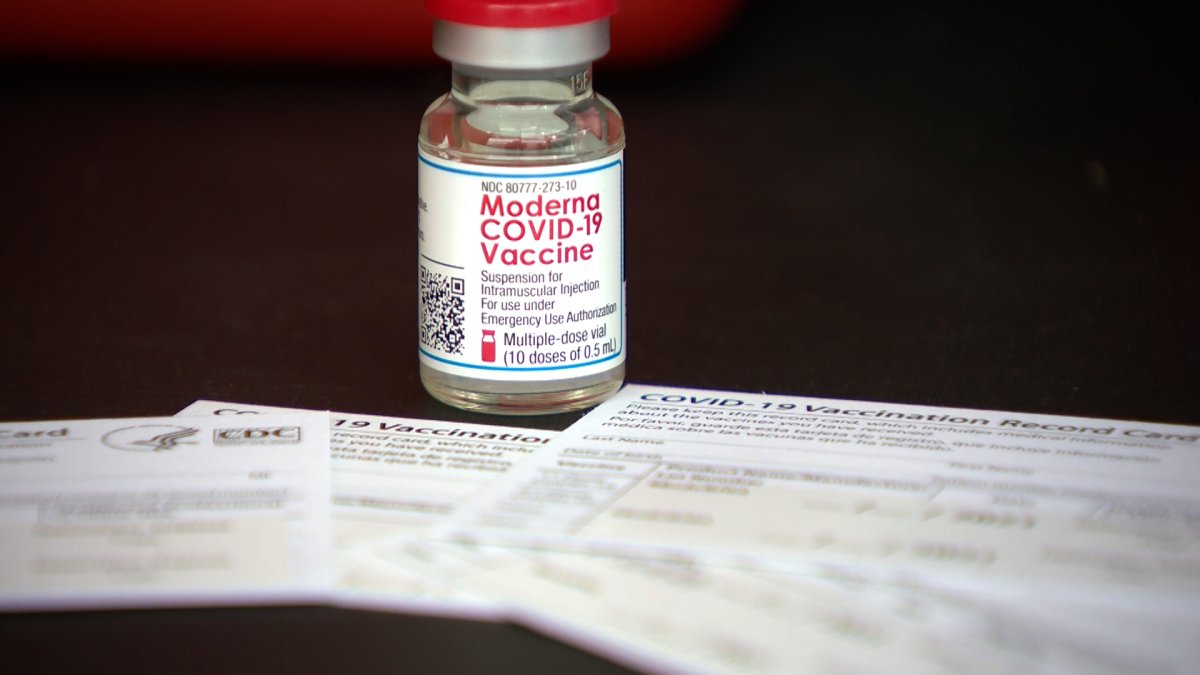
Moderna booster shots are nearing authorization for millions of additional people, but can you get one right now?
Moderna booster shots are nearing authorization for millions of additional people, but can you get one right now?
Currently, the boosters are only available for those with compromised immune systems.
But additional authorization could come by the end of the week.
A panel of U.S. health advisers unanimously recommended a half-dose booster of the similar Moderna vaccine for certain groups last week. The panel's vote marked the first step in a review process that also includes sign-off from the leadership of both the Food and Drug Administration and the Centers for Disease Control and Prevention.
Feeling out of the loop? We'll catch you up on the Chicago news you need to know. Sign up for the weekly Chicago Catch-Up newsletter here.
Federal regulators are expected to authorize both Moderna and Johnson & Johnson shots this week.
If the FDA approves, there’s still another hurdle: A panel convened by the Centers for Disease Control and Prevention will need to offer more specifics on who should get one.
The CDC's advisory panel is expected to meet Thursday to discuss booster dose data. Once the panel makes its recommendation, a decision from the CDC is expected to follow soon after.
Illinois' health department said it is already anticipating the CDC will authorize the shots for both vaccines.
Who would be eligible and when for a Moderna or J&J booster shot?
The FDA panel voted unanimously to recommend a Moderna booster shot for seniors, as well as younger adults with other health problems, jobs or living situations that put them at increased risk from COVID-19. The doses would be given to those who received their second dose at least six months ago.
But there's no evidence that it's time to open booster doses of either the Moderna or Pfizer vaccine to everybody, the panel stressed — despite initial Biden administration plans to eventually do that.
Who is already eligible for a COVID booster shot?
Officials have so far cleared booster doses of both the Pfizer and Moderna vaccines for people with weakened immune systems.
According to the CDC, immunocompromised groups include people who have:
- Been receiving active cancer treatment for tumors or cancers of the blood
- Received an organ transplant and are taking medicine to suppress the immune system
- Received a stem cell transplant within the last 2 years or are taking medicine to suppress the immune system
- Moderate or severe primary immunodeficiency (such as DiGeorge syndrome, Wiskott-Aldrich syndrome)
- Advanced or untreated HIV infection
- Active treatment with high-dose corticosteroids or other drugs that may suppress your immune response
The agency notes that "people should talk to their healthcare provider about their medical condition, and whether getting an additional dose is appropriate for them."
Why would Moderna's be a half-dose?
As for the dose, initial Moderna vaccination consists of two 100-microgram shots. But Moderna says a single 50-microgram shot should be enough for a booster.
The FDA panel wrestled with whether Moderna presented enough evidence backing its low-dose booster.
As the delta variant surged in July and August, a Moderna study found people who were more recently vaccinated had a 36% lower rate of “breakthrough” infections compared with those vaccinated longer ago.
Another study of 344 people found a six-month booster shot restored virus-fighting antibodies to levels thought to be protective — and that included large jumps in antibodies able to target the delta variant. But that was a small study, and only about half of those people got the exact series of doses that would be offered under a Moderna booster campaign.
“The data itself is not strong but it is certainly going in the direction that is supportive of this vote,” said Dr. Patrick Moore of the University of Pittsburgh.
And several advisers worried that boosting with a lower dose might cost people some of the potential benefit of a full-strength third shot.
“That may actually have a tremendous impact on the durability,” Kurilla said.
Moderna said it chose the lower-dose booster because it triggered fewer uncomfortable shot reactions such as fever and achiness but also leaves more vaccine available for the global supply.
“Now we have twice as much vaccine to go around,” Dr. Robert Murphy,executive director of the Institute for Global Health at Northwestern University Feinberg School of Medicine, said in a statement. “That’s a big thing. By recommending half a dose, you just doubled the amount of vaccine available. And theoretically there could be fewer side effects with a lower dose.”